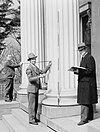File:Fenwick Hall Plantation, Northeast of intersection of River Road and Maybank Highway, Johns Island, Charleston County, SC HABS SC,10-CHAR,413-39.tif

Original file (5,500 × 4,317 pixels, file size: 22.65 MB, MIME type: image/tiff)
Captions
Captions
Summary[edit]
| - Fenwick Hall Plantation, Northeast of intersection of River Road and Maybank Highway, Johns Island, Charleston County, SC | |||||
|---|---|---|---|---|---|
| Title |
- Fenwick Hall Plantation, Northeast of intersection of River Road and Maybank Highway, Johns Island, Charleston County, SC |
||||
| Description |
Simons, Albert, Architect; Morawetz, Victor, Owner; Morawetz, Marjorie, Owner; Clinton, Henry; Fenwick, John; Aydin, Caglar, delineator; Bartlett, Laurel, delineator; Causey, Charlotte, delineator; Kerlin, Lia Farina, delineator; Ferguson, Katherine, delineator; Finnigan, Kelly, delineator; Ford, Emily, delineator; Fuhrmann, Robert, delineator; Golden, Lauren, delineator; Haremski, Elise, delineator; Harvey, Elyse, delineator; Johnson, Julianne, delineator; Lavalle, Brittany, delineator; Long, Rebecca, delineator; Madill, Wendy, delineator; Marasco, Stefanie, delineator; Nickels, Neale, delineator; Quandt, Rebecca, delineator; Reynolds, Joseph, delineator; Schley, Mary Margaret, delineator; Schwartz, Mariah, delineator; Sondermann, Karl, delineator; Tew, Julia, delineator; Tianying, Sun, delineator; Uebel, Amy Elizabeth, delineator; Valiente, Syra, delineator; Watts, Daniel, delineator; Weirick, David, delineator; Weidman, Jamie, delineator; Kendrick, Pamela, field team supervisor; Shaw, Liz, field team supervisor; Leifeste, Amalia, faculty sponsor; Wilson, Ashley R., faculty sponsor; Dinler, Mesut, delineator; Yambay, Fabiana, delineator |
||||
| Depicted place | South Carolina; Charleston County; Johns Island | ||||
| Date | Documentation compiled after 1933 | ||||
| Dimensions | 4 x 5 in. | ||||
| Current location |
Library of Congress Prints and Photographs Division Washington, D.C. 20540 USA http://hdl.loc.gov/loc.pnp/pp.print |
||||
| Accession number |
HABS SC,10-CHAR,413-39 |
||||
| Credit line |
|
||||
| Notes |
|
||||
| References |
|
||||
| Source | https://www.loc.gov/pictures/item/sc0848.photos.364543p | ||||
| Permission (Reusing this file) |
|
||||
| Object location | 32° 45′ 02.96″ N, 80° 02′ 18.18″ W | View this and other nearby images on: OpenStreetMap |
|---|
File history
Click on a date/time to view the file as it appeared at that time.
| Date/Time | Thumbnail | Dimensions | User | Comment | |
|---|---|---|---|---|---|
| current | 20:37, 1 August 2014 |  | 5,500 × 4,317 (22.65 MB) | Fæ (talk | contribs) | GWToolset: Creating mediafile for Fæ. HABS 2014-08-01 (3201:3400) |
You cannot overwrite this file.
File usage on Commons
The following 2 pages use this file:
- File:- Fenwick Hall Plantation, Northeast of intersection of River Road and Maybank Highway, Johns Island, Charleston County, SC HABS SC,10-CHAR,413-39.tif (file redirect)
- File:Fenwick Hall Plantation, Northeast of intersection of River Road and Maybank Highway, Johns Island, Charleston County, SC HABS SC,10-CHAR,413-39.tif
Metadata
This file contains additional information such as Exif metadata which may have been added by the digital camera, scanner, or software program used to create or digitize it. If the file has been modified from its original state, some details such as the timestamp may not fully reflect those of the original file. The timestamp is only as accurate as the clock in the camera, and it may be completely wrong.
| Author | Library of Congress |
|---|---|
| Width | 5,500 px |
| Height | 4,317 px |
| Compression scheme | Uncompressed |
| Pixel composition | Black and white (Black is 0) |
| Orientation | Normal |
| Number of components | 1 |
| Number of rows per strip | 11 |
| Horizontal resolution | 1,100 dpi |
| Vertical resolution | 1,100 dpi |
| Data arrangement | chunky format |
| File change date and time | 17:08, 30 April 2003 |

